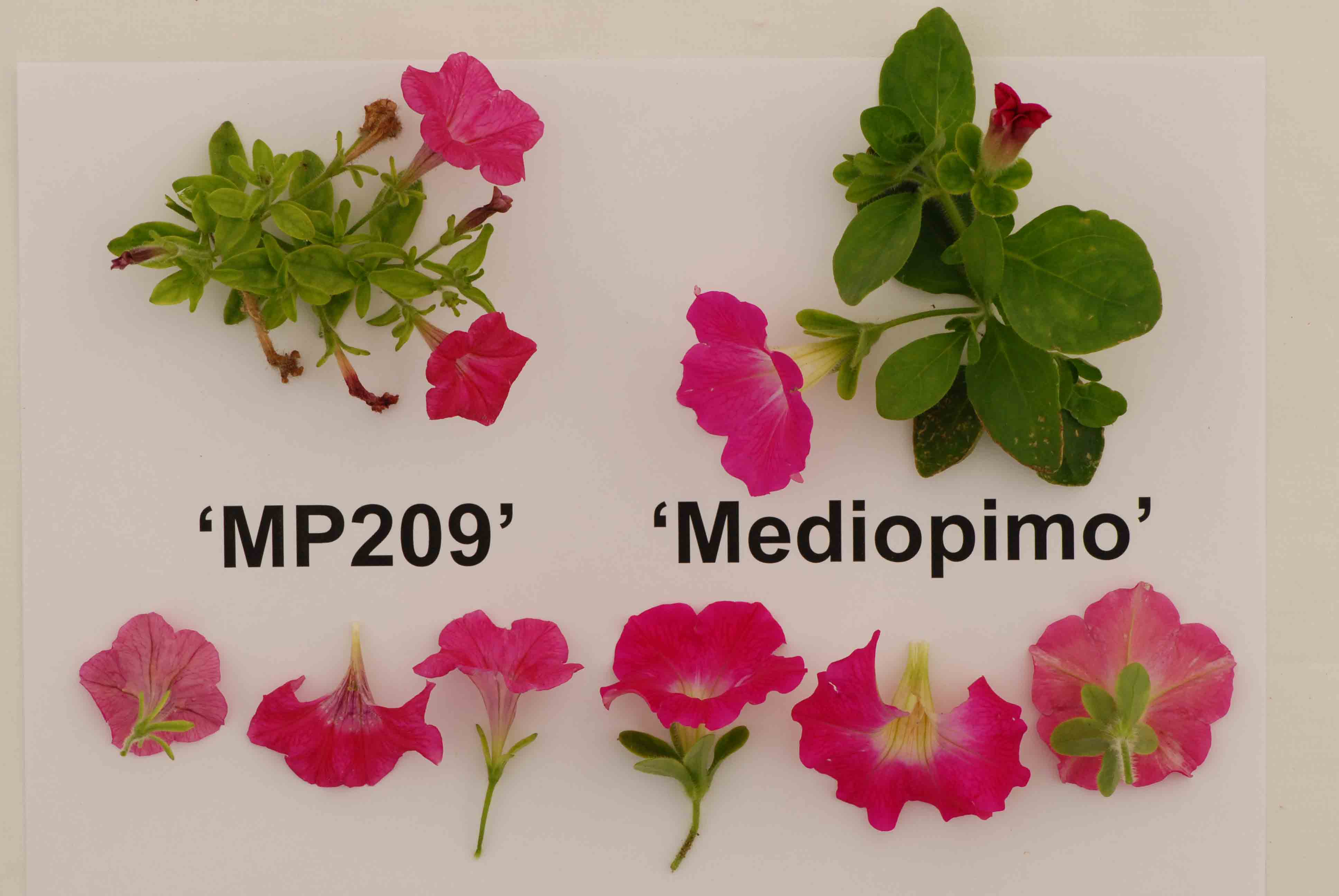MP209
| Denomination: | 'MP209' |
|---|---|
| Trade name: | Tiny Tunia Rose |
| Botanical Name: | Petunia ×hybrida |
| Applicant/Holder: |
NuFlora International Pty. Ltd. 63 Wills Road Macquarie Fields, New South Wales 2564 Australia |
| Breeder: |
Graham Noel Brown, Baulkham Hills, Australia |
| Agent in Canada: |
Variety Rights Management 475 County Road 18 R.R. #2 Oxford Station, Ontario K0G 1T0 Canada Tel: 613-258-9015 |
| Application Date: | 2004-08-13 |
| Application Number: | 04-4317 |
| Grant of Rights Date: | 2008-10-24 |
| Certificate Number: | 3379 |
| Date rights revoked: | 2013-03-14 |
Variety Description
Varieties used for comparison: 'Mediopimo' (Supertunia Mini Bright Pink) and 'Constraw' (Mini Strawberry Pink Veined)
Summary: 'MP209' is a petunia variety which has slightly smaller leaves than 'Constraw' and significantly smaller leaves than 'Mediopimo'. The corolla of 'MP209' is smaller in diameter than the corolla of the reference varieties. The veins on the upper side of the corolla of 'MP209' are weakly to moderately conspicuous, whereas the veins on the corolla of 'Constraw' are very strongly conspicuous. The corolla tube of 'MP209' is violet on the inner side, while the corolla tube of 'Mediopimo' is light yellow,with the colour extending onto the corolla lobes at the transition to the tube.
Description:
PLANT: creeping growth habit
SHOOT: medium thickness, short to medium length, no anthocyanin colouration
LEAF: elliptic shape, broad acute apex, no variegation, medium green on upper side, blistering absent
SEPAL: linear to obovate shape, no anthocyanin
FLOWER: single, funnel form
COROLLA LOBE: one colour on upper side, blue pink, weakly to moderately conspicuous purple veins, medium undulation of margin
COROLLA TUBE: violet on inner side, moderately conspicuous veins
ANTHER: yellowish white before dehiscence
Origin & Breeding History: 'MP209' was developed from a Petunia × hybrida breeding program located at the University of Sydney Plant Breeding Institute Cobbitty (PBIC), in Cobbitty, New South Wales, Australia. This vegetative breeding program is aimed at producing compact but spreading, small flowered petunia varieties. The parents 'X01.85.1' (female) and 'X01.131.1' (male) were crossed in December 2001. These parents were crossbreeds from the proprietary program. The new variety was selected from the F1 seedling population in October 2002 and was tested for uniformity and stability in tissue culture propagation. The initial selection criteria were for flower colour, early flowering and habit.
Tests & Trials: Trials for 'MP209' were conducted in a polyhouse at Oxford Station, Ontario during the summer of 2006. The trials consisted of 15 plants of each variety, planted in 15 cm pots and spaced at approximately 30 cm apart on the bench. Observations and measurements were taken from 10 plants of each variety. Colour determinations were done using the 2001 Royal Horticultural Society (RHS) Colour Chart.
Comparison tables for 'MP209' with reference varieties 'Mediopimo' and 'Constraw'
Leaf blade length (cm)
| 'MP209' | 'Mediopimo' | 'Constraw' | |
|---|---|---|---|
| mean | 2.50 | 4.64 | 3.44 |
| std. deviation | 0.35 | 0.36 | 0.47 |
Leaf blade width (cm)
| 'MP209' | 'Mediopimo' | 'Constraw' | |
|---|---|---|---|
| mean | 0.99 | 2.33 | 1.36 |
| std. deviation | 0.06 | 0.51 | 0.18 |
Diameter of corolla (mm)
| 'MP209' | 'Mediopimo' | 'Constraw' | |
|---|---|---|---|
| mean | 35.57 | 54.43 | 45.63 |
| std. deviation | 2.76 | 4.83 | 3.70 |
Main colour of corolla lobe (RHS)
| 'MP209' | 'Mediopimo' | 'Constraw' | |
|---|---|---|---|
| upper side | 67B-C | N74B-C to 155A at throat | N66C |
Main colour of corolla tube (RHS)
| 'MP209' | 'Mediopimo' | 'Constraw' | |
|---|---|---|---|
| inner side | 75B-C | 158C | 75A |
Click on image for larger view

Petunia: 'MP209' (left) with reference variety 'Constraw' (right)
Click on image for larger view

Petunia: 'MP209' (left) with reference variety 'Mediopimo' (right)
- Date modified: